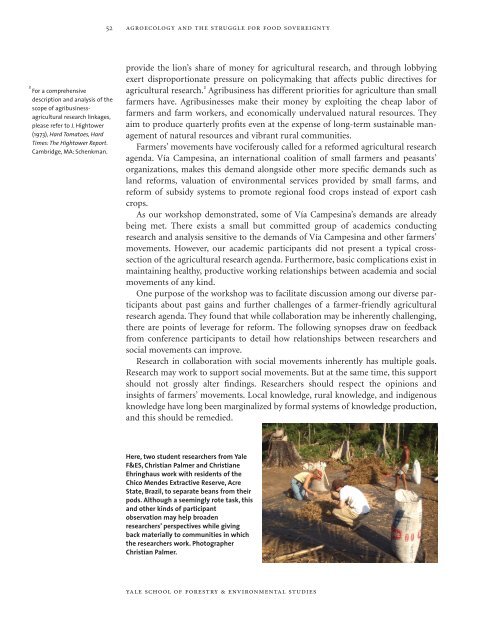Agroecology and the Struggle for Food Sovereignty ... - Yale University
Agroecology and the Struggle for Food Sovereignty ... - Yale University
Agroecology and the Struggle for Food Sovereignty ... - Yale University
You also want an ePaper? Increase the reach of your titles
YUMPU automatically turns print PDFs into web optimized ePapers that Google loves.
52<br />
agroecology <strong>and</strong> <strong>the</strong> struggle <strong>for</strong> food sovereignty<br />
2 For a comprehensive<br />
description <strong>and</strong> analysis of <strong>the</strong><br />
scope of agribusinessagricultural<br />
research linkages,<br />
please refer to J. Hightower<br />
(1973), Hard Tomatoes, Hard<br />
Times: The Hightower Report.<br />
Cambridge, MA: Schenkman.<br />
provide <strong>the</strong> lion’s share of money <strong>for</strong> agricultural research, <strong>and</strong> through lobbying<br />
exert disproportionate pressure on policymaking that affects public directives <strong>for</strong><br />
agricultural research. 2 Agribusiness has different priorities <strong>for</strong> agriculture than small<br />
farmers have. Agribusinesses make <strong>the</strong>ir money by exploiting <strong>the</strong> cheap labor of<br />
farmers <strong>and</strong> farm workers, <strong>and</strong> economically undervalued natural resources. They<br />
aim to produce quarterly profits even at <strong>the</strong> expense of long-term sustainable management<br />
of natural resources <strong>and</strong> vibrant rural communities.<br />
Farmers’ movements have vociferously called <strong>for</strong> a re<strong>for</strong>med agricultural research<br />
agenda. Vía Campesina, an international coalition of small farmers <strong>and</strong> peasants’<br />
organizations, makes this dem<strong>and</strong> alongside o<strong>the</strong>r more specific dem<strong>and</strong>s such as<br />
l<strong>and</strong> re<strong>for</strong>ms, valuation of environmental services provided by small farms, <strong>and</strong><br />
re<strong>for</strong>m of subsidy systems to promote regional food crops instead of export cash<br />
crops.<br />
As our workshop demonstrated, some of Vía Campesina’s dem<strong>and</strong>s are already<br />
being met. There exists a small but committed group of academics conducting<br />
research <strong>and</strong> analysis sensitive to <strong>the</strong> dem<strong>and</strong>s of Vía Campesina <strong>and</strong> o<strong>the</strong>r farmers’<br />
movements. However, our academic participants did not present a typical crosssection<br />
of <strong>the</strong> agricultural research agenda. Fur<strong>the</strong>rmore, basic complications exist in<br />
maintaining healthy, productive working relationships between academia <strong>and</strong> social<br />
movements of any kind.<br />
One purpose of <strong>the</strong> workshop was to facilitate discussion among our diverse participants<br />
about past gains <strong>and</strong> fur<strong>the</strong>r challenges of a farmer-friendly agricultural<br />
research agenda. They found that while collaboration may be inherently challenging,<br />
<strong>the</strong>re are points of leverage <strong>for</strong> re<strong>for</strong>m. The following synopses draw on feedback<br />
from conference participants to detail how relationships between researchers <strong>and</strong><br />
social movements can improve.<br />
Research in collaboration with social movements inherently has multiple goals.<br />
Research may work to support social movements. But at <strong>the</strong> same time, this support<br />
should not grossly alter findings. Researchers should respect <strong>the</strong> opinions <strong>and</strong><br />
insights of farmers’ movements. Local knowledge, rural knowledge, <strong>and</strong> indigenous<br />
knowledge have long been marginalized by <strong>for</strong>mal systems of knowledge production,<br />
<strong>and</strong> this should be remedied.<br />
Here, two student researchers from <strong>Yale</strong><br />
F&ES, Christian Palmer <strong>and</strong> Christiane<br />
Ehringhaus work with residents of <strong>the</strong><br />
Chico Mendes Extractive Reserve, Acre<br />
State, Brazil, to separate beans from <strong>the</strong>ir<br />
pods. Although a seemingly rote task, this<br />
<strong>and</strong> o<strong>the</strong>r kinds of participant<br />
observation may help broaden<br />
researchers’ perspectives while giving<br />
back materially to communities in which<br />
<strong>the</strong> researchers work. Photographer<br />
Christian Palmer.<br />
yale school of <strong>for</strong>estry & environmental studies

















